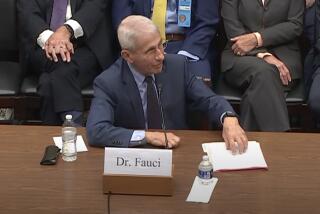Report Expands Cunningham Scandal’s Scope
WASHINGTON — In addition to the other corrupt dealings that forced his resignation from Congress, former Rep. Randy “Duke” Cunningham used his position on the House Intelligence Committee to steer more than $70 million in federal funds to companies run by cronies, according to a new report by the House panel.
The document expands the scope of the Cunningham bribery scandal to one of the most sensitive committee assignments in Congress. It also alludes to other potential abuses, describing gifts received by other committee members and “dealings that Cunningham had with certain foreign nationals” that are still being scrutinized by federal investigators.
The report is the culmination of an internal probe launched last year after Cunningham, a Republican from Rancho Santa Fe, pleaded guilty to accepting $2.4 million in bribes. The document is certain to add to the partisan tensions on the panel weeks before an election that could swing control of the House.
The full text of the report remains classified, but a five-page summary was released Tuesday by the committee’s top Democrat, Jane Harman of Venice, who has repeatedly voiced frustration with the refusal of the panel’s Republicans to make the findings public.
In an interview, Harman said she gave committee Chairman Peter Hoekstra (R-Mich.) “every opportunity” to issue a joint statement in putting out the report, and she rejected suggestions that its release was timed for political effect.
“The right time to have put this out was when it was completed, in late July,” Harman said.
Hoekstra described Harman’s decision to release the summary as “disturbing and beyond the pale.” He said the document was an “interim, internal report” and suggested that Harman was seeking “to politicize the committee and this critical inquiry.”
The investigation was led by Michael L. Stern, a former senior attorney in the House Office of the General Counsel. He declined to comment Tuesday.
The investigation found no evidence of criminal activity by other lawmakers or committee aides, according to the report. But it describes a permissive environment in which staffers ignored or failed to act on “red flags” surrounding Cunningham’s unusual funding requests.
Overall, it characterizes Cunningham’s actions as part of a broader pattern of corruption in which he sought to influence officials in Congress, the Pentagon and intelligence agencies. “This was a lot of people to persuade, cajole, deceive, pressure, intimidate, bribe or otherwise influence,” the report said.
According to the investigation, Cunningham repeatedly pressured aides to insert special funding provisions, known as earmarks, designed to enrich businessmen who were paying the lawmaker millions in bribes.
Over a five-year period, the report said, Cunningham inserted language into spending bills adopted by the intelligence panel that provided approximately $70 million to $80 million for those companies. The committee oversees about $40 billion in annual spending on the nation’s spy agencies. Because budget details are classified, the public has virtually no ability to scrutinize individual contracts.
Cunningham’s guilty plea in November was primarily based on his activities as a member of the defense appropriations subcommittee, which mainly deals with military spending budgets.
Most of the money that Cunningham earmarked went to companies operated by Poway businessman Brent R. Wilkes and Wilkes’ former associate, Mitchell Wade of Washington. Wilkes remains under investigation, and Wade pleaded guilty in February to bribing Cunningham and offering illegal inducements to Pentagon officials.
Intelligence committee staff members were “fully aware” that Cunningham’s requests were designed to steer money to these contractors, according to the report.
Some even voiced concern that the projects appeared wasteful and questioned “the ethics and integrity of Wade.”
“Despite these red flags,” the report said, “the responsible staff members continued to accept and support Cunningham’s growing requests” for earmarks.
One such contract was with a Pentagon operation known as the Counterintelligence Field Activity. The committee’s ability to monitor the operation was “seriously impeded by the corrupt conspiracy between Cunningham and Wade,” the report said.
The report also examined the relationship between a former committee aide, Brant Bassett, and a senior CIA official, Kyle Dustin “Dusty” Foggo, who rose to the agency’s No. 3 position before he was forced out this year after becoming a focus of the expanding Cunningham investigation.
Bassett was not in a position to assist Cunningham in his funding requests, the report said. But Bassett and Foggo “worked together to achieve certain objectives relating to the management of the CIA,” and sought to induce lawmakers on the committee by providing them “government trinkets,” including a carpet with the words “Global War on Terror.” Committee officials declined to elaborate.
One former official downplayed the gifts to lawmakers, saying that agencies routinely give coffee mugs, baseball hats and other items with their logos to lawmakers who visit overseas stations or attend briefings.
The report recommends “additional inquiry” into whether Bassett had any involvement in awarding CIA contracts to Wilkes or other contractors involved in the scandal.
Bassett did not respond to a request for comment. Attorneys for Cunningham and Wade declined to comment.
*
More to Read
Get the L.A. Times Politics newsletter
Deeply reported insights into legislation, politics and policy from Sacramento, Washington and beyond. In your inbox three times per week.
You may occasionally receive promotional content from the Los Angeles Times.










